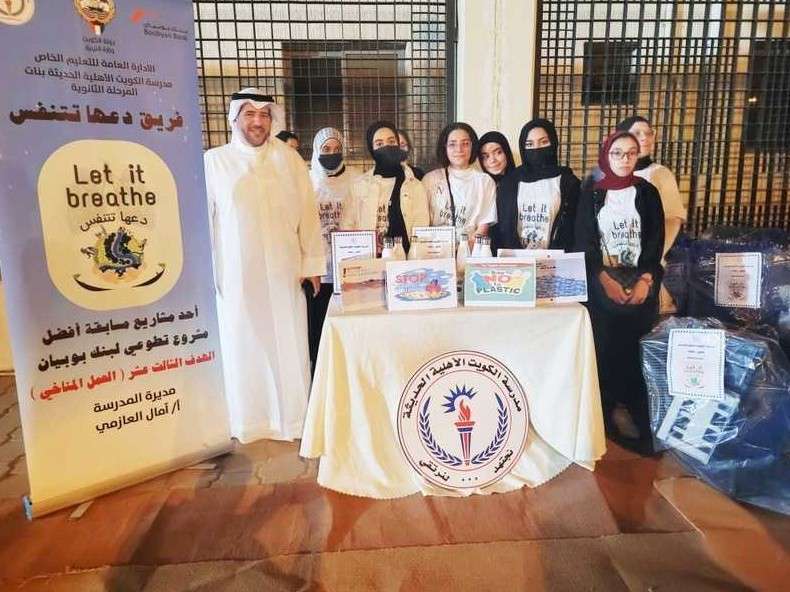Latest News
- Kuwait Arrested 18 Drug Dealers
- 8 More Mental Health Clinics To Be Open
- Fishermen's Makeshift Houses Ordered To Be Removed By Kuwait
- Kuwait Cracks Down On Bachelors
- Non-oil Exports Of Kuwait Reached 106 Million Dinars In January,...
- Kuwait Joins The Global Celebration Of World Press Freedom Day
- Kuwaitis In UAE Advised To Exercise Caution Amid Unstable Weathe...
- MEW Has No Plans For Power Cuts And Is Ready To Tackle The Summe...
- Allow Employees To Transfer If Their Monthly Dues Are Not Paid
- Appeal Court Upholds Death Ruling In Friend’s Kill
- Pakistani Expat Died In A Tragic Accident
- The Hourly Domestic Workers Service Is A New Scam
Salmi's Sheikh Al-ahmad Described Eight New Waste Recycling Plants

Sheikh Abdullah Al-Ahmad, Director-General of the Environment Public Authority, emphasized the need of continuing to engage with appropriate government institutions to minimize the proportion of pollutants thrown in Kuwait Bay.
In a press statement issued yesterday on the sidelines of the 'Its Role is Right' event, Al-Ahmad stated that steps are being taken to combat pollutants resulting from rainwater sewers that flow into Kuwait Bay and that the idea of installing a water treatment plant inside each sewer before it reaches the sea remains viable. According to a local Arabic newspaper, the EPA intends to undertake this scheme.
He went on to say that the project for these treatment facilities is still on the table, pending approval from the Ministry of Finance. He stated that the Ministry of Works is now striving to minimize the proportion of pollutants put into rainfall sewers and that the EPA is also doing its bit to investigate unlawful sewer connections in order to limit the amount of garbage and pollutants in Kuwait Bay.
"We are working according to the options available to recycle the garbage in Salmi and other regions," Al-Ahmad said of the new permits for recycling factories. There are more than 15 recycling factory licenses in the country, including eight in Salmi."
"There are numerous sites in Salmi for recycling," he said, "through which plastic, glass, paper, and any other garbage will be recycled according to environmental legislation and the authority's waste policy."
The Director-General of the Environment Public Authority emphasized the importance of continuing environmental awareness campaigns in the community, noting that "when developing this idea, the number of landfills in Kuwait will be reduced and contribute to increasing the economic viability of factories," and that the ultimate goal is to eliminate, not increase, landfills in Kuwait by recycling all waste.
"We concentrated on plastic since it is one of the most hazardous wastes in the environment, as well as one of the easiest wastes to recycle," he continued.
Trending News
-
 Expat Residency Law Amended By Kuwait Ministerial...
20 April 2024
Expat Residency Law Amended By Kuwait Ministerial...
20 April 2024 -
 Ministry Announces Separate Time For Amnesty Seeke...
21 April 2024
Ministry Announces Separate Time For Amnesty Seeke...
21 April 2024 -
 The Ministry Connects With Violators Of Residency...
23 April 2024
The Ministry Connects With Violators Of Residency...
23 April 2024 -
 Work Permits Will Be Issued For One Year Under The...
27 April 2024
Work Permits Will Be Issued For One Year Under The...
27 April 2024 -
 AstraZeneca Admits Covid Vaccine Can Cause Rare Si...
29 April 2024
AstraZeneca Admits Covid Vaccine Can Cause Rare Si...
29 April 2024 -
 3 Expats Caught In Salmiya With 213 Bottles Of Loc...
23 April 2024
3 Expats Caught In Salmiya With 213 Bottles Of Loc...
23 April 2024 -
 Temperature Increases Cause Electricity Load Index...
21 April 2024
Temperature Increases Cause Electricity Load Index...
21 April 2024 -
 Al-Nuer Festival Celebrates Kuwaiti Agriculture Wi...
22 April 2024
Al-Nuer Festival Celebrates Kuwaiti Agriculture Wi...
22 April 2024 -
 Peak-time 'cut-offs' Raise Fears Of An Electricity...
22 April 2024
Peak-time 'cut-offs' Raise Fears Of An Electricity...
22 April 2024 -
 Road Trip From Kuwait To Bahrain Via Saudi: Travel...
22 April 2024
Road Trip From Kuwait To Bahrain Via Saudi: Travel...
22 April 2024












Comments Post Comment